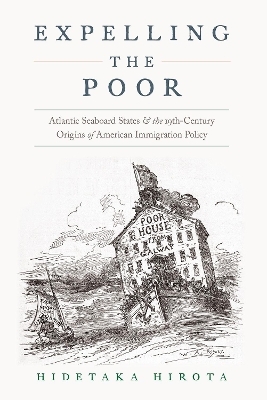
Expelling the Poor
Oxford University Press Inc (Verlag)
978-0-19-005556-1 (ISBN)
Historians have long assumed that immigration to the United States was free from regulation until anti-Asian racism on the West Coast triggered the introduction of federal laws to restrict Chinese immigration in the 1880s. Studies of European immigration and government control on the East Coast have, meanwhile, focused on Ellis Island, which opened in 1892.
In this groundbreaking work, Hidetaka Hirota reinterprets the origins of immigration restriction in the United States, especially deportation policy, offering the first sustained study of immigration control conducted by states prior to the introduction of federal immigration law. Faced with the influx of impoverished Irish immigrants over the first half of the nineteenth century, nativists in New York and Massachusetts built upon colonial poor laws to develop policies for prohibiting the landing of destitute foreigners and deporting those already resident to Europe, Canada, or other American states. These policies laid the foundations for federal immigration law. By investigating state officials' practices of illegal removal, including the overseas deportation of citizens, this book reveals how the state-level treatment of destitute immigrants set precedents for the use of unrestricted power against undesirable aliens. It also traces the transnational lives of the migrants from their initial departure from Ireland and passage to North America through their expulsion from the United States and postdeportation lives in Europe, showing how American deportation policy operated as part of the broader exclusion of nonproducing members from societies in the Atlantic world.
By locating the roots of American immigration control in cultural prejudice against the Irish and, more essentially, economic concerns about their poverty in nineteenth-century New York and Massachusetts, Expelling the Poor fundamentally revises the history of American immigration policy.
Hidetaka Hirota is a Visiting Assistant Professor of History at the City College of New York. He was formerly a Mellon Research Fellow in the Society of Fellows in the Humanities at Columbia University.
Acknowledgments
Introduction
Chapter 1 "Shovelling Out": Ireland and the Emigration of the Poor
Chapter 2 Problems of Irish Poverty: The Rise of State Control on the Atlantic Seaboard
Chapter 3 Different Paths: The Development of Immigration Policy in Antebellum Coastal States
Chapter 4 Radical Nativism: The Know Nothing Movement and the Citizenship of Paupers
Chapter 5 A New Birth of Poverty: Pauper Policy in the Age of the Civil War and Reconstruction
Chapter 6 The Journey Continued: Post-Deportation Lives in Britain and Ireland
Chapter 7 The Moment of Transition: State Officials, the Federal Government, and the Formation of American Immigration Policy
Conclusion
Appendices
Notes
Bibliography
Index
| Erscheinungsdatum | 29.07.2019 |
|---|---|
| Zusatzinfo | 13 illus. |
| Verlagsort | New York |
| Sprache | englisch |
| Maße | 155 x 231 mm |
| Gewicht | 454 g |
| Themenwelt | Sachbuch/Ratgeber ► Geschichte / Politik ► Allgemeines / Lexika |
| Geschichte ► Allgemeine Geschichte ► Neuzeit (bis 1918) | |
| Geisteswissenschaften ► Geschichte ► Regional- / Ländergeschichte | |
| Sozialwissenschaften ► Politik / Verwaltung ► Politische Theorie | |
| Sozialwissenschaften ► Politik / Verwaltung ► Staat / Verwaltung | |
| Sozialwissenschaften ► Soziologie | |
| ISBN-10 | 0-19-005556-1 / 0190055561 |
| ISBN-13 | 978-0-19-005556-1 / 9780190055561 |
| Zustand | Neuware |
| Informationen gemäß Produktsicherheitsverordnung (GPSR) | |
| Haben Sie eine Frage zum Produkt? |
aus dem Bereich


